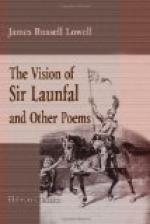“He was a brilliant wit and a delightful humorist; a discursive essayist of unfailing charm; the best American critic of his time; a scholar of wide learning, deep also when his interest was most engaged; a powerful writer on great public questions; a patriot passionately pure; but first, last, and always he was a poet, never so happy as when he was looking at the world from the poet’s mount of vision and seeking for fit words and musical to tell what he had seen. But his emotion was not sufficiently ‘recollected in tranquillity.’ Had he been more an artist he would have been a better poet, for then he would have challenged the invasions of his literary memory, his humor, his animal spirits, within limits where they had no right of way. If his humor was his rarest, it was his most dangerous gift; so often did it tempt him to laugh out in some holy place.... Less charming than Longfellow, less homely than Whittier, less artistic than Holmes, less grave than Bryant, less vivid than Emerson, less unique than Poe, his qualities, intellectual, moral and esthetic, in their assemblage and cooerdination assign him to a place among American men of letters which is only a little lower than that which is Emerson’s and his alone.”—John White Chadwick.
THE VISION OF SIR LAUNFAL
Early in 1848 in a letter to his friend Briggs, Lowell speaks of The Vision of Sir Launfal as “a sort of story, and more likely to be popular than what I write generally. Maria thinks very highly of it.” And in another letter he calls it “a little narrative poem.” In December, 1848, it was published in a thin volume alone, and at once justified the poet’s expectations of popularity. The poem was an improvisation, like that of his “musing organist,” for it was written, we are told, almost at a single sitting, entirely within two days. The theme may have been suggested by Tennyson’s Sir Galahad, but his familiarity with the old romances and his love of the mystical and symbolic sense of these good old-time tales were a quite ample source for such suggestion. Moreover Lowell in his early years was much given to seeing visions and dreaming dreams. “During that part of my life,” he says, “which I lived most alone, I was never a single night unvisited by visions, and once I thought I had a personal revelation from God Himself.” The Fairie Queen was “the first poem I ever read,” he says, and the bosky glades of Elmwood were often transformed into an enchanted forest where the Knight of the Red Cross, and Una and others in medieval costume passed up and down before his wondering eyes. This medieval romanticism was a perfectly natural accompaniment of his intense idealism.




